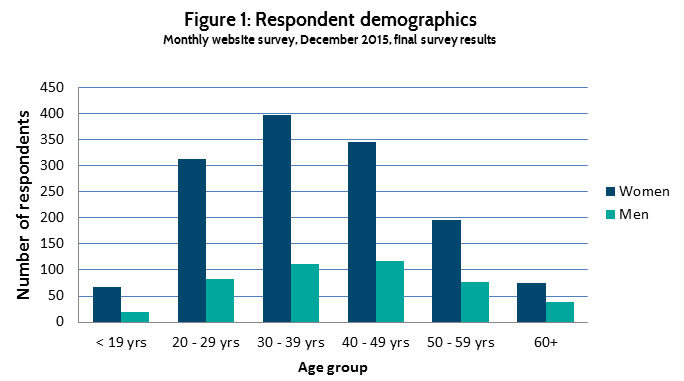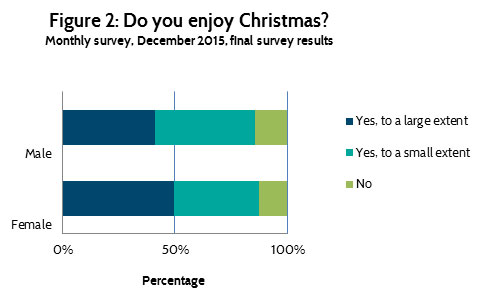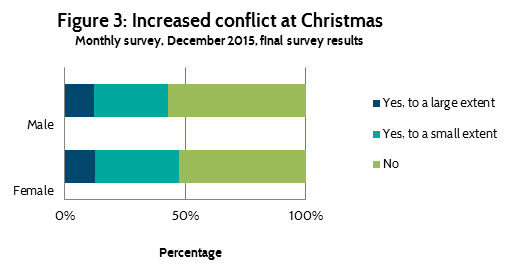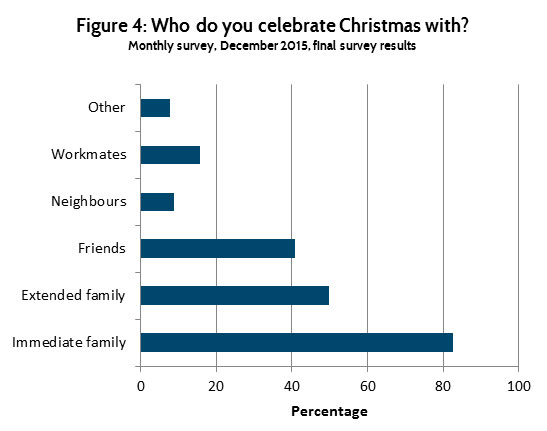Last Christmas, Relationships Australia examined the effect of Christmas stress on family relationships in our two-minute online monthly survey. The questions were developed based on our practice experience and prior research that identifies the Christmas period as a time of high stress for some families.
Introduction
Last Christmas, Relationships Australia examined the effect of Christmas stress on family relationships in our two-minute online monthly survey. The questions were developed based on our practice experience and prior research that identifies the Christmas period as a time of high stress for some families.
Christmas is the most likely time of the year for many people to experience anxiety and depression, particularly those who are divorced, have experienced a death in the family or are socially isolated. Increased stress over the Christmas period can be associated with financial and time pressure from the costs of buying gifts, entertaining and holidays, and managing competing work-family tensions. There can be added strain from spending time with family members, and it also may represent the time that people negatively reflect on another lost year. Those people living in separated, blended or stepfamilies can face significant challenges in managing complex family structures and contact arrangements with children.
While preparing for Christmas may be stressful in itself, causal factors commonly associated with poor mental health at other times of the year are also more prevalent in the Christmas period. These include relationship breakdown, workplace stress, and financial pressures.
Relationships Australia sought to further explore the effect of Christmas stress on family relationships by asking visitors to our website to participate in the December 2015 two minute survey. December’s questions focussed on how visitors to our website celebrate Christmas and family conflict.
Previous research finds that…
- Around one-third of male and female monthly survey respondents indicated that their family relationships were highly negatively affected at Christmas due to work-life balance factors.
- One‑third of people responding to the monthly survey reported that their family relationships were highly negatively affected due to financial worries at Christmas.
- When asked about the effects of increased consumption of food, drugs, alcohol or gambling on their family relationships at Christmas, around 16 per cent of men and women reported that their family relationships were highly negatively affected.
- Around one-sixth of women and one-quarter of men reported their family relationships were highly affected by different expectations, beliefs or values around Christmas.
Results
More than 1900 people responded to the Relationships Australia online survey in December. Around three-quarters of survey respondents (76%) identified as female.
As was the case for last month’s survey, more females than males responded in every age group (figure 1). More than ninety per cent (95%) of survey respondents were aged between 20‑59 years, with the highest number of responses collected for women aged between 30-39 years (inclusive).

A higher proportion of men and a lower proportion of people from the youngest and oldest age groups responded to December’s survey than in previous months; however, the demographic profile of survey respondents remains consistent with our experience of the people that would be accessing the Relationships Australia website.
A substantial majority of survey respondents indicated that they celebrated Christmas (men – 92%; women – 95%). Celebration of Christmas was not necessarily related to people’s religious status, with just over forty per cent of people who celebrated Christmas to a large extent, and a further sixty per cent of people who celebrated Christmas to a small extent indicating that they did not identify with a religion.
While the majority of survey respondents also indicated that they enjoyed Christmas, 12 per cent of women and 14 per cent of men reported that they did not enjoy Christmas (figure 2).

Consistent with the results of the November 2014 monthly online survey, a high proportion of survey respondents reported that their family relationships were negatively affected at Christmas. Figure 3 shows that twelve per cent of men and women reported that their family relationships were affected to a large extent by increased conflict, while a further one-third of men and women reported that their family relationships were affected to a small extent by increased conflict between family members at Christmas (Men – 31%; women 35%).

More than eighty per cent (83%) of survey respondents reported that they celebrated Christmas with their immediate family, and a further fifty per cent celebrated Christmas with their extended family. Forty per cent of survey respondents celebrated Christmas with friends and a further one-sixth (16%) reported celebrating Christmas with workmates (figure 4).

There was a small, but significant relationship between increased family conflict and whether survey respondents celebrated Christmas with immediate family. Survey respondents who reported celebrating Christmas with immediate family were more likely to report that their family relationships were affected by increased conflict at Christmas.
References
Hawton, K. (1997). Attempted suicide. In Cognitive Behaviour Therapy: Science and Practice (eds D. Clark and C. Fairburn), pp. 285-312. Oxford: Oxford University Press.
Hawton, K. (2000). Sex and suicide: Gender differences in suicidal behaviour, British Journal of Psychiatry, 177:484-485.
National Mental Health Commission (NMHC). 2013: A contributing Life, the 2013 National Report Card on Mental Health and Suicide Prevention. Sydney: NMHC.